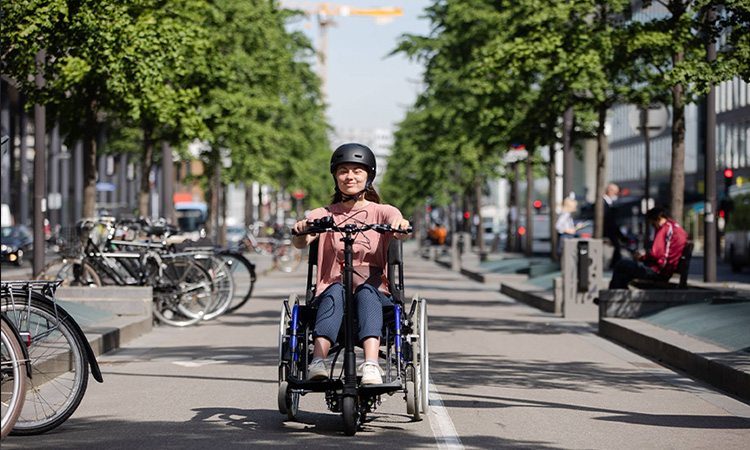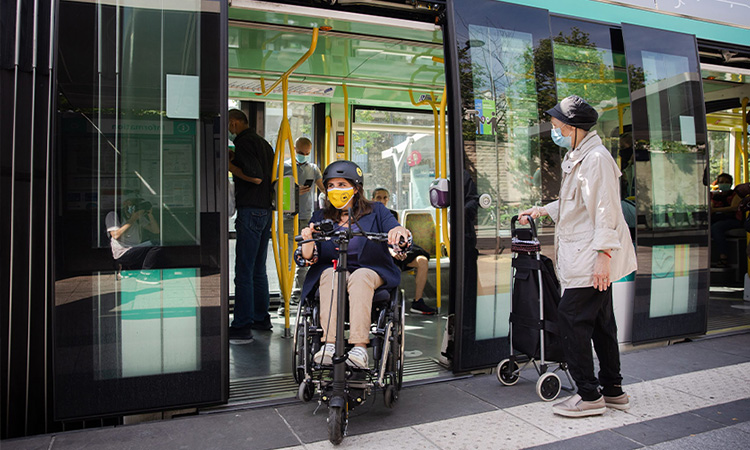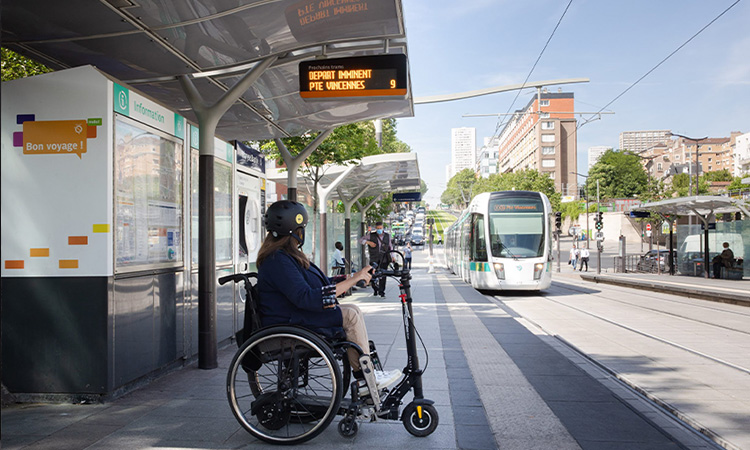The importance of making micro-mobility services more accessible for disabled people
- Like
- Digg
- Del
- Tumblr
- VKontakte
- Buffer
- Love This
- Odnoklassniki
- Meneame
- Blogger
- Amazon
- Yahoo Mail
- Gmail
- AOL
- Newsvine
- HackerNews
- Evernote
- MySpace
- Mail.ru
- Viadeo
- Line
- Comments
- Yummly
- SMS
- Viber
- Telegram
- Subscribe
- Skype
- Facebook Messenger
- Kakao
- LiveJournal
- Yammer
- Edgar
- Fintel
- Mix
- Instapaper
- Copy Link
Posted: 6 June 2023 | Georgia Heathman - TIER Mobility | No comments yet
From partnering with start-ups like Omni to develop wheelchair-accessible e-scooters to collaborating with UCL to create a universal sound for e-scooters, Georgia Heathman, Head of Public Policy, Safety & Inclusion at TIER Mobility, discusses the importance of making micro-mobility accessible to all and the initiatives that are being undertaken by TIER Mobility in order to achieve this goal.


Credit: TIER Mobility
How can urban mobility contribute to a more equitable and liveable environment? Institutions, municipal governments and private companies like TIER Mobility are working together on projects designed to help cities to become less noisy, produce fewer emissions and improve quality of life. Globally, we are in a really exciting time. We are re-examining the very idea of urban mobility, looking at how we can make it more sustainable and improve the liveability of our cities. To achieve these ambitions, it’s vital that services are designed with an accessibility lens from the outset. Simply put, to be inclusive of as many people as possible.
We are re-examining the very idea of urban mobility, looking at how we can make it more sustainable and improve the liveability of our cities. To achieve these ambitions, it’s vital that services are designed with an accessibility lens from the outset”
Currently, 15% of people around the world are disabled1 and roughly one-third of disabled people have no public transportation options available to them2. Therefore, we need to do more to meet the needs of disabled people.
It’s important to recognise, alongside freedom from negative impacts, that the broad benefits of micro-mobility should be enjoyed by all. This includes benefits such as improved air quality, the re-allocation of public space away from private cars and wider environmental benefits.
Within the micro-mobility industry, we are focused on reducing reliance on private cars. This doesn’t mean that we expect everyone to switch to a shared vehicle for every journey. We already see a significant share of riders using our services to replace car rides and for intermodal trips to connect with other public transport modes. Our latest Citizen Research project, where we surveyed 8,000 people across 13 European cities, shows that, on average, 17.3% of our rides replace car journeys, with this share increasing to as high as 22% in cities such as Berlin.
We need to (and indeed do) deploy actions across marketing, community engagement, network design and new technologies and products to improve accessibility to micro-mobility transport”
Alongside advocating for regulatory frameworks that champion accessibility and value creation, as an active micro-mobility operator, we bear a significant responsibility to build these values into our services directly – and there is much more to be done. For e-scooters, we still tend to see greatest use by young, non-disabled white men than any other demographic. The solutions to enabling wider demographics to use our services aren’t singular and there are no silver bullets. We need to (and indeed do) deploy actions across marketing, community engagement, network design and new technologies and products to improve accessibility to micro-mobility transport.
Technology as an enabler for people trying to access mobility services
Technology can be both an enabler and a barrier to access for marginalised groups, including disabled people… However, app-based services offer flexibility and accessibility in areas where traditional alternatives are not viable”
Technology can be both an enabler as well as a barrier to access for many marginalised groups in our society, including disabled people. Firstly, it is important to recognise that advances in technology have underpinned many positive changes in how we move around our cities, from ride-hailing and ride-sharing through to micro-mobility. Delivering our services is not possible without the support of an app. You cannot have a dockless system without users having a smartphone to be able to locate vehicles in their city, and to start and end their rides.
Using our app also supports customers to safely navigate across our cities, suggesting routes along cycle infrastructure designed to better protect users of micro-mobility. However, we know that this can be a barrier to access for some users. The benefits of being app-based, however, means that we can be flexible in how our service works, and it means that we can offer our service in areas where more common alternatives like docked cycle schemes are not sustainable. It also means that we are able to remove the docking process, which can be a physical barrier, and offer free-floating parking models that support end-to-end journeys.
Technology can be a big enabler in other ways, too. We are working with University College London (UCL) to develop a universal sound for e-scooters to emit while being ridden in order to ensure that all pedestrians, particularly blind and partially sighted people, can recognise this new class of vehicle when navigating city environments.


Credit: TIER Mobility
TIER Mobility pilots wheelchair-accessible e-scooters in France
In addition to technology, hardware also plays a crucial role in making micro-mobility more accessible. In Saint-Quentin-en-Yvelines and Bordeaux, France, we have partnered with Omni, a start-up that has developed a way to enable wheelchair users to utilise e-scooters. Through this collaboration, we hope to provide greater freedom and autonomy to people for whom the current e-scooter and e-bike designs are not accessible.
Through this collaboration, we hope to provide greater freedom and autonomy to people for whom the current e-scooter and e-bike designs are not accessible”
Omni, a French start-up that won the famous innovation competition Concours Lépine in 2021, has created a solution that allows, through a universal fixing, a wheelchair to attach to an e-scooter.
Through the partnership, TIER and Omni have launched a rental programme for wheelchair accessible e-scooters in Saint-Quentin-en-Yvelines, helping to provide the 1.4 million wheelchair users in Paris with improved access to urban mobility. The pilot of this unique initiative was launched with the support of the Banque Publique d’Investissement (BPI) and the Île-de-France Region. The partnership has recently been expanded to Bordeaux, where we will be offering a 25% discount for the inhabitants of Bordeaux and Nouvelle Aquitaine.
Connecting to 95% of wheelchairs on the market, the technology enables manual wheelchair users to utilise powered mobility at a much lower fee than a wheelchair power attachment – which costs approximately £4,000.
“Omni is changing the way that we look at mobility with myomniTrott’, a wheelchair drive solution that combines comfort, performance and inclusion,” said Charlotte Alaux, CEO and Co-Founder of Omni. “I’ve been in a wheelchair since I was four years old, and for a long time I was frustrated that I couldn’t move around easily, that I wasn’t independent, that I didn’t feel free to go where I wanted. This dream of feeling like everyone else became a reality during my first experience in a myomniTrot’. The indescribable sensations and the emotions that arose made us realise that our prototype had to be known by as many people as possible. This is how Omni was born in 2020, with the goal of revolutionising the disability sector through affordable and inclusive mobility solutions.”
With exclusive new data from TIER showing that one in 10 of its riders identify as being disabled, TIER, which is also in the process of developing partnerships with other major French cities, is hoping to build on partnerships such as OMNI and better support diversity of users in all of its markets.


Credit: TIER Mobility
Providing a safer urban environment for blind and partially sighted people
The goal of [Lazarillo’s] co-operation with TIER is safer mobility for everyone. By integrating mobility points, blind and visually impaired people will be able to get more information about their surroundings”
With the aim to improve the safety and independent travel for all road users, including those with visual impairments, TIER has partnered with Lazarillo, the world’s most inclusive wayfinding and mapping solution. As part of the partnership, alerts for parked TIER e-scooters have been added to the Lazarillo App for blind and partially sighted people in several European countries.
In February 2023, Lazarillo and TIER had announced the extension of their collaboration for a new project that aims to predict how safe a route is. The project will be piloted in Italy and will also start later in 2023. The aim is to collect data from different sources – including data about e-scooters, as well as infrastructure and trip hazards – to rate routes and give them a safety score.
With this new implementation, we will use the location of the scooters in real-time, as well as the real-time reports from users to rate the safety level of each pavement. This will also allow Lazarillo to direct its users via the safest route to their destinations, using multiple parameters based on user preferences and shared mobility real-time locations. This project could even be scalable to improve safety for other disabled people while navigating cities.
“The goal of our co-operation with TIER is safer mobility for everyone. By integrating mobility points, blind and visually impaired people will be able to get more information about their surroundings. This innovation has great potential to improve navigation throughout the city,” said René Espinoza, CEO and Founder of Lazarillo.
The importance of considering accessibility from the initial design stage of any mobility service
While accessibility must be considered at all stages, it is just as important to create a service which can be iteratively improved and become more accessible over time”
Considering accessibility for any mobility service is critical – and micro-mobility is no exception. Not only because it is the right thing to do, but because it makes good business sense.
While accessibility must be considered at all stages, it is just as important to create a service which can be iteratively improved and become more accessible over time. This means both the vehicles and software. Our work with Omni, Lazarillo and with developing a universal e-scooter sound show how we, as an industry, can react and make our services more accessible over time.
References
- https://www.worldbank.org/en/topic/disability
- https://www.ncbi.nlm.nih.gov/books/NBK11420/#:~:text=Roughly%20one%2Dthird%20of%20people,services%20is%20beside%20the%20point


Related topics
Micro-mobility, Mobility Services, Passenger Accessibility, Passenger Experience, Sustainable Urban Transport
Issue
Issue 2 2023
Related modes
Bikes & Scooters
Related organisations
Omni, TIER, TIER Mobility, UCL
Related people
Charlotte Alaux, Georgia Heathman, René Espinoza








